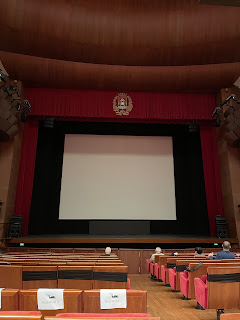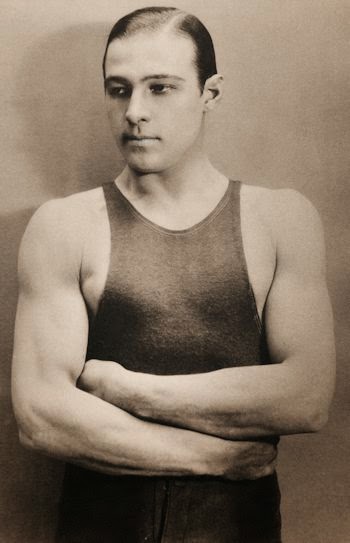Le Giornate del Cinema Muto - Day 3
I can scarcely believe the festival is 3 days in! Tempus fugit! I am still suffering from jet lag, majorly so. Dragged my sorry self to the first program of actualities Film Coloniali Olandesi/Dutch Colonial Films. Staying awake for these travelogues was a struggle, TBH. I soldiered on and made it, with the help from the excellent accompaniment of Jose Maria Serralde Ruiz. My brain is pretty fuzzy about what I saw, more horses at a stud farm, I found myself wondering how the poor animals survived the heat and humidity.
The Riscoperte/Rediscoveries was another program of Norma Talmadge. The Pathe-Baby film that preceded was Japan of Today (1918). It made me wish this film had been in color to show off all the flags and kimonos.
The first film was something different from the printed catalogue which was an errata printed twice. Memories in Men’s Souls (1914) was screened. Norma ages in this one from dark haired young lady to white haired lady. Costarring a young Antonio Moreno! The second film was Elsa’s Brother (1915) in which Elsa’s brother is a bad egg and gets sent away to make good. He, naturally, falls into his bad ways in the mining town and gets in a fight with another guy and is at death's door. His condition is touch and go. Elsa who performs good works and helps the less fortunate gets accosted on the way home by two thugs, she is rescued by the guy who nearly killed her brother (naturally). They become friendly and fall in love. He searches for any sign of her brother and is made to understand he is presumed dead. In reality, the brother has recovered and has written his family he is coming home a changed man. After finding a photo of her brother, he confesses to killing him and leaves. The letter is soon delivered as is the return of the prodigal son. All is well, everyone is forgiven and love triumphs.
Next up was The Forbidden City (1918) produced by Joseph Schenck and directed by Sidney Franklin. This is one of several films where Norma Talmadge was cast in some other ethnicity. In this case, a dual role as a Chinese girl San San and later as her half Chinese/half American daughter Toy. This is a reverse riff on Madama Butterfly, except the Chinese characters are racist and the Americans are all filled with worldly brotherly love. All the major Asian characters were all portrayed by white actors, of course.
Norma’s costumes were gorgeous. Her first character San San falls in love with the American diplomat John Worden (Thomas Meighan) who is taking lessons in Mandarin from her father. Her father pledges her to the Emperor to get back in his good graces. Meighan gets transferred to another posting and they are parted. It is when she is presented to the Emperor she reveals she has given birth to a child. The Emperor has her father taken away (to be executed). After she pleads with him, the Emperor takes pity on her and leads her to the garden of peace where she will be set free. She is, by virtue of a gruesome walk into the garden where troops of men with spears stab her to death. The Emperor has Toy raised by ladies of the court constantly humiliated, as a warning that the two races can never mix.
18 years pass and Toy is feisty and angry. She looks longingly across to the American Consulate and the American flag longing to escape. A kindly guard in the palace offers to help her, he sacrifices himself and she applies for passage to America. The consul looks kindly on her and sends her to Manila. While there she is placed with the nursing staff to live, soon she is an accomplished nurse herself. One who has fallen in loved with one of the officers Lt. Halbert. One night she is called upon to care for the lead consular diplomat, guess who that is? If you guessed her father who had no idea he had a daughter, you would have guessed correctly. In a further twist, John Worden is also the guardian to Lt. Philip Halbert who he forbids to marry Toy. That night as he suffers from his illness he remembers and calls for San San. Toy dresses up in her mother’s silk clothes and hugs the delirious man. Lt. Halbert is called back and as Worden dies, he blesses the pair to marry. A lot that can be cringeworthy in this film. With Neil Brand’s sympathetic accompaniment, the film played with just the right notes that I could forgive and overlook the cringe.
A lunch with a friend took longer than expected, so I ended up missingVenezia 90 program of Po Horack, Po Dolack/Over Mountains, Over Valleys (1930) from Czechoslovakia. Sometimes things get missed.
Riscoperte/Rediscoveries began with a mini documentary on the eruption f Mt. Etna in 1923, La Montagne Infidele by Jean Epstein. What we know today of the brave (foolhardy?) people who today document active volcanos, I was amazed at some of the footage knowing that bulky tripods and cameras were the equipment used. Panchromatic film would have given more details, but, Etna was not erupting in 1925! The main feature was a series of 42 early cinema from Lumiere Suisse. It is 24 hours later and I cannot even give you a rundown of what I saw, the short films all begin to blur after a while.
The final session began with more Pathe-Baby including the charming Le Creation du Petit Monde which had newborn baby girls appearing from bunches of blooming roses and spunky baby boys from cabbages (what is it with the French and babies springing forth from a cabbage patch?)
Next we had an Actuality touring Morrocco from 1910 and a film that was visually arresting, but, incomprehensible to me the abstract Hande das leben und die liebe eines. Balletic and abstract.
The main attraction was Abel Gance’s 1918 film Le Dixieme Symphonie. I am not going to fully recap this tale of love, murder, blackmail and sacrifice. Lots of foreshadowing to Confession starring Kay Francis. What I will say it was a fine film, new discovery Emmy Lynn and beeUtiful gowns. As wonderful as the performances were the true star of the evening was John Sweeney on the piano. His score was epic, the symphonie sequence earned loud applause in the middle of the film and a standing ovation with calls of BRAVO. It is a film experience I will not soon forget.
Movies = 60
Gelato = 1





Comments